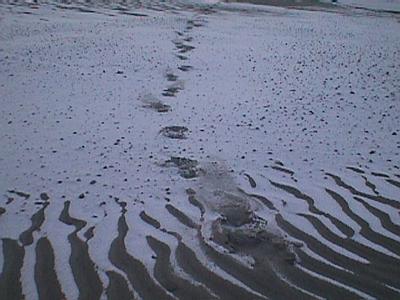4 December, 1999
This is it! (I think.) The plane from Christchurch (CHC) has landed. I have
gone through "bag drag" (This is like the check-in process I went though in
CHC.) We have had our final Cape Roberts meeting. The weather appears good
and I am manifested for a flight tomorrow morning (12/5/99 NZT). Even though
you never know around this place until the wheels leave the ground, this
will be my last journal entry from the ice.
Throughout this entire adventure you have heard about my experiences
in Antarctica. I hope you will allow me to take a moment to thank a few
people, without whose efforts, I would not have had this wonderful
opportunity.
First of all the National Science Foundation and the Office of Polar
Programs, in parcticular Wayne Sukow, the Director of the Division of
Elementary, Secondary, and Informal Science Education (ESIE) at NSF. Wayne
is, in large part, responsible for the existence of the TEA program and he
was the one who called me to inform me of my parcticipation. He has been a
support and help ever since. I want to thank Stephanie Shipp at Rice
University who coordinates the TEA program and has organized the logistics
of the program. Thanks to Emily Olanoff who has coordinated the TEA web
site.
I want to thank my friend and colleague Cary Anderson, who took a break from
a well-deserved retirement to teach my classes. I cannot express the comfort
it gave me knowing that my students were in such professional and competent
hands. Thank as well to the Appleton Area School District for the support
given to me on this project as well as in the past.
On the ice, I want to thank all of the Cape Roberts Team members who
I have recognized in various ways in my journals and are too numerous to
mention now. I am very grateful for their willingness to share their
knowledge and let me, in some small way, become part of their family. I need
to give parcticular thanks to Peter Webb. Peter has been tolerant of me and
interested in the work I am doing with children He has also been extremely
generous by allowing me to share the resources of the Cape Roberts Project
to make my experience as fulfilling as possible. Thank you to the palynology
group (or POD) Mike Hannah, Rosie Askin and Ian Raine for letting me be of
some assistance in the project and sharing with me their time and expertise.
I parcticularly want to thank John Simes, my partner in crime in the lab. He
taught me a great deal, not only about lab procedures but how to work hard
and how to be kind with those who you work with.
I owe a great deal to John Wrenn. First of all for his willingness
to step into uncharted waters by inviting a total stranger into his world.
This took a great deal of courage, vision and kindness. John has been
patient, persistent and supportive in all of my interactions with him. He
recognized the importance of my TEA work as equal to my work on the Cape
Roberts Project. He has allowed me to become part of a very significant
piece of scientific research. I felt from my first interactions with John
that he considered me a full partner in this endeavor. Thank you John for
your tolerance and incredibly hard work.
I want to express thanks to all of my friends (old and new), family,
colleagues and those of you who just happened to browse into my ramblings.
It made the task of writing the journals a joy knowing that people were
reading them and finding something of value.
Thanks to all of the students, mine and those of others, who used
this site to learn something about this very unique place. I hope you gained
something from the words and pictures, but more importantly, that this is
only the start of your education about Antarctica.
Finally, I want to thank my children, Ellie (who e-mailed me all the time)
and Matthew (who never e-mailed, but I know he meant to.) for just
tolerating their father (and a little love would be nice as well). To my
long-suffering wife Pam, I love you, I miss you, thank you for your support
and love. I am on my way home.

To all of you who have given me the opportunity to leave my footprints on the frozen continent of Antarctica, Thank you.
Contact the TEA in the field at
.
If you cannot connect through your browser, copy the
TEA's e-mail address in the "To:" line of
your favorite e-mail package.
|
